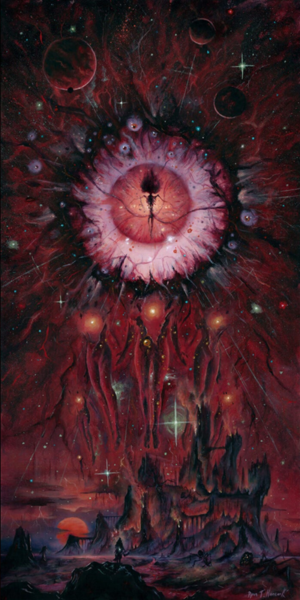At Postcards from Barsoom, John Carter considers what might occupy the god-shaped space in the new secular religion of wokeness:

Ryan T. Hancock, via Postcards from Barsoom
It’s trite to observe that the Great Awokening is a fundamentally religious phenomenon, representing a sort of secular Abrahamic heresy mining the latent guilt swirling within the hearts of post-Christian whites and thereby activating the messiah complexes of the Anglosphere’s Protestant populations, who have exhibited other similarly self-destructive enthusiasms throughout their ethnoreligious histories. It’s trite because it’s so obviously apt, but it raises an obvious question: if Woke is a cult, what is its god?
I don’t mean whichever symbols or causes they flock to from one moment to the next. These are merely mortal embodiments of archetypal forms, rising perhaps to the level of heroes or saints should their celebration become widespread enough. George Floyd was not deified but beatified, not because of anything he did in his life (which no one really argues wasn’t a sewer of petty criminality), but because in his death he was filled with a holy spirit of some kind. What spirit was that?
One answer to this question is provided in the title of Lorenzo Warby‘s ongoing series “Worshipping the Future“. As Warby explains in “The Deep Appeal of Marxism“, progressivism is besotted with the transformational future, an imaginary utopia qualitatively different from and superior to the Tartarus of antiquity in every way – an Elysium of peace, stability, equality, wealth, ease, comfort, and bliss, existing in a perpetual state of liberatory ecstasy in which the war, chaos, poverty, strife, suffering, and misery of the past have been permanently eradicated.
As Warby writes, there is no limit to the delights of the transformational future:
As a thing imagined, it can be imagined to be as perfect as one likes. This means politics grounded in an imagined future can be as morally grandiose as one likes, with whatever moral urgency goes with such imaginings.
This is deeply intoxicating.
Grounding one’s politics in an imagined future also provides huge rhetorical advantages, precisely because said future is as perfect as one wants it to be. Anyone who wishes to defend some actually existing thing has the problem that it will be the product of trade-offs and human failings.
An “imagined future” believer, by contrast, can just wish all that away for political purposes while hanging current imperfections on those who wish to defend what exists. In any contest between the actual and the imagined, the imagined sparkles ever so more brightly.
This utopia is of course always at some point just over the horizon. Just one more revolution, bro, and we’ll reach the Promised Land! Just one more gulag, and we’ll get to utopia, I swear! C’mon bro, just one more mass grave, we’re almost there, you gotta believe me!
There is a fatal epistemic flaw at the heart of this faith: no information can be extracted from the future, because information can only be obtained from the past.
Not only does the imagined future have no reality test, it distorts one’s use of the information to which we do have access. The past is profoundly discounted by its distance and difference from the imagined future. It is both morally discounted — a record of sin and depravity — and structurally discounted, because it has not undergone the social transformations that are imagined to change everything.
If the imagined future is a secular heaven, then the past becomes a moral hell from which we must escape. All information from it is tainted as profoundly impure and corrupt: the record of sin.
This means that when policies fail to obtain the desired result, for example erasing ethnic and sexual distinctions through affirmative action and thereby producing the new Marxist Homo tabularasa, no corrective action is possible. Policy failure exists in the past, which is ignored as sinful, and which therefore cannot be learned from. The only permissible answer to failed progress is to progress faster, with the only possible consequence being to fail harder.



